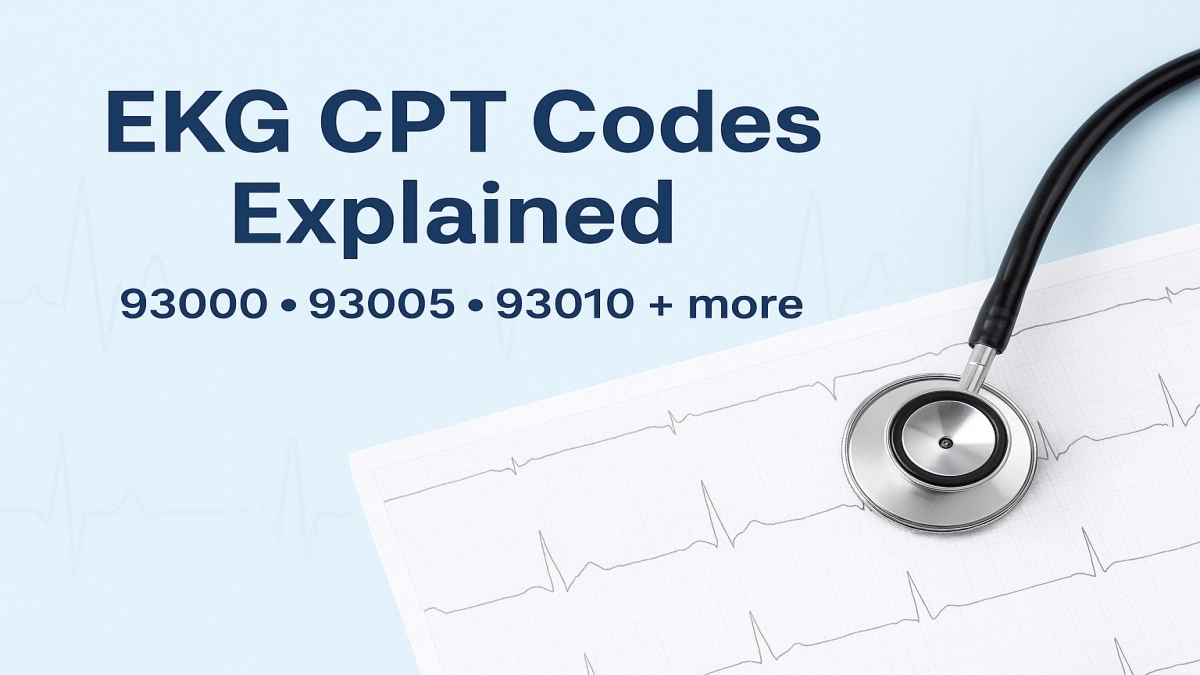What is an EKG?
An electrocardiogram (EKG or ECG) is a quick, non-invasive test that records the electrical activity of the heart. Doctors use it to:
- Measure how long it takes for electrical impulses to move through the heart. This shows if the heartbeat is normal, fast, slow, or irregular.
- Measure the strength of the electrical activity. This can help detect if parts of the heart are too large, overworked, or damaged.
Because EKGs are simple and widely available, they are one of the most common tests in cardiology and emergency medicine.
Why an EKG is Performed
An EKG may be ordered if a patient has:
- Chest pain or pressure
- Shortness of breath
- Irregular heartbeat or palpitations
- Dizziness or fainting
- Risk factors for heart disease such as hypertension, diabetes, or family history
Doctors also use it to monitor heart medications, check for past heart attacks, and as part of routine pre-surgical evaluations.
Cost of an EKG in the U.S.
The cost depends on whether you are insured and where the test is performed.
- With insurance: Expect a copay between $30–$100.
- Without insurance: The cost ranges from $500 to $3,000, with an average around $1,500.
- Hospital vs. clinic pricing: Hospitals and large metropolitan centers usually charge more than smaller clinics or community facilities.
Tip: If you’re uninsured, asking for a cash-pay discount or going to an urgent care clinic instead of a hospital can lower costs.
CPT Codes for EKG
The Current Procedural Terminology (CPT) system assigns codes to medical services for billing. For EKGs, the main CPT codes are:
- 93000 – Routine 12-lead EKG with interpretation and report
- 93005 – 12-lead EKG, tracing only (no interpretation or report)
- 93010 – 12-lead EKG, interpretation and report only
- 93040 – Rhythm EKG, 1–3 leads, with interpretation and report
- 93041 – Rhythm EKG, 1–3 leads, tracing only
- 93042 – Rhythm EKG, 1–3 leads, interpretation and report only
Common ICD-10 Diagnosis Codes Used with EKGs
When billing, the EKG CPT code must be paired with an appropriate diagnosis code to show medical necessity. Common ICD-10 codes include:
- I10 – Essential (primary) hypertension
- R94.31 – Abnormal electrocardiogram
- I25.2 – Old myocardial infarction
- Z01.810 – Pre-procedural cardiovascular exam
- R00.2 – Palpitations
- R07.9 – Chest pain, unspecified
Documentation Requirements
According to CPT and Medicare guidelines, the EKG interpretation must be recorded as a separate, signed report.
Example:
“EKG interpretation: Normal sinus rhythm, rate 62 bpm, normal axis, no ST-T changes, no interval changes compared with prior tracing (5/2023). Interpreted and signed by Dr. Smith.”
Best practice: Always use the phrase “interpreted by me” rather than “reviewed by me,” since payers may deny claims if it looks like you only reviewed another provider’s work.
Coding Tips and Modifier Use
- Do not use modifier -26 on EKG codes unless specifically required. Use the exact CPT code that reflects what was performed (93005 vs 93010 vs 93000).
- Only the provider who personally interprets the tracing should bill for the interpretation.
- If two doctors interpret the same EKG, only one can be reimbursed. Payer policy decides who.
Reimbursement Rates (Medicare and Private Insurance)
As of the 2024 Medicare Physician Fee Schedule:
- 93010 (EKG interpretation only): ~0.24 RVUs ≈ $9 per tracing
- 93042 (Rhythm strip interpretation): ~0.20 RVUs ≈ $7 per tracing
Private insurance may reimburse higher, sometimes two to four times the Medicare rate.
Challenges with EKG Billing
Hospitals and practices face issues such as:
- Multiple providers reading the same EKG (leading to denial of duplicate claims)
- Missed billing due to poor reconciliation between EKG machines, hospital records, and billing systems
- Interfaces: Some hospitals use dual systems (demo + charge interface), increasing the chance of coding errors
Tip: Always reconcile the number of EKGs read with the number submitted for billing. Practices can lose up to 10–30% of reimbursement without reconciliation.
Medicare and Medicaid Coverage
- Medicare covers medically necessary EKGs, usually limited to one interpretation per tracing. Stress EKGs are covered for patients with symptoms of heart disease.
- Medicaid coverage varies by state, but generally includes EKGs for diagnosis or monitoring of cardiovascular conditions.
- All claims must include both primary and secondary ICD-10 codes that support medical necessity.
Key Takeaways
- Use the correct CPT code (93000, 93005, 93010, etc.) based on whether you performed the tracing, the interpretation, or both.
- Document a separate, signed report with the phrase “interpreted by me.”
- Pair CPT codes with appropriate ICD-10 codes to avoid denials.
- Expect Medicare to reimburse around $7–$9 per tracing, with private payers often paying more.
- Reconcile your records to avoid missing reimbursement.

